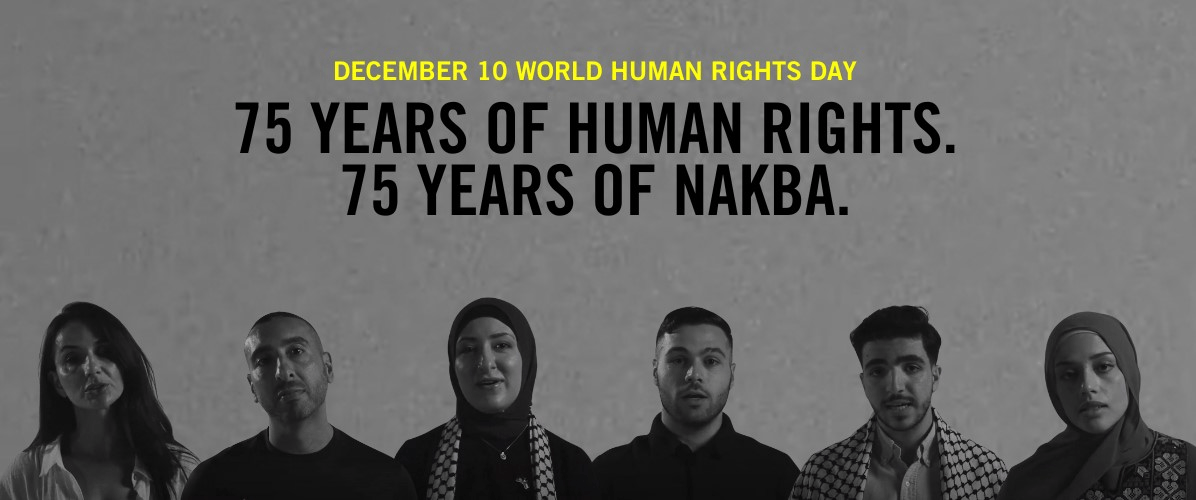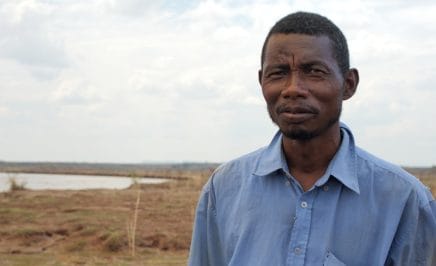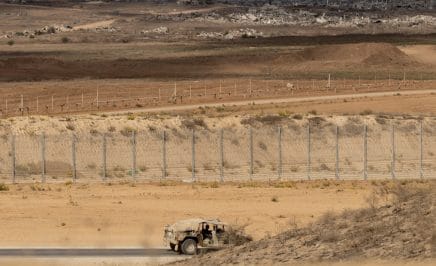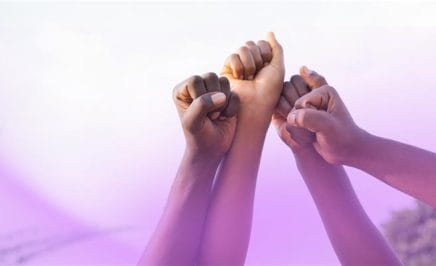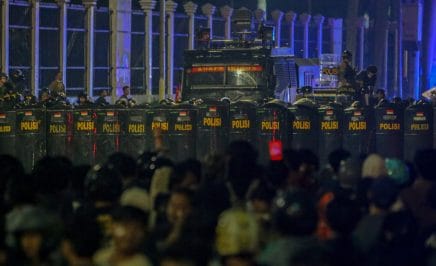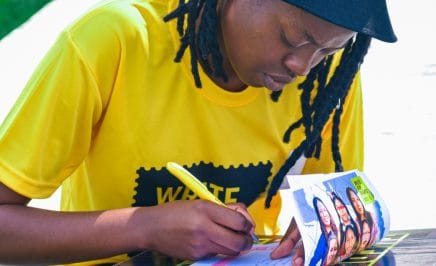75 Years of Human Rights. 75 Years of Nakba.
In 1948, the UN General Assembly adopted the Universal Declaration of Human Rights (UDHR). Thirteen years later, in 1961, Amnesty International was founded, and our global movement has been helping people across the world claim their fundamental rights ever since.
This World Human Rights Day marks 75 years of the UDHR, the landmark document that enshrines the rights of all human beings regardless of race, religion, gender or any other marker. It’s a jarring parallel and a stark reminder of reality that 2023 also marks 75 years since the Nakba. The Nakba – meaning ‘catastrophe’ in Arabic – refers to a period of violence and mass displacement endured by the Palestinian people, and this is still their nightmare today.
World Human Rights Day is intended as a global day of empowerment for all of humanity. But it’s clear that the dream of “universal human rights” remains an aspiration, rather than a reality. As people in the Occupied Palestinian Territories are bombarded with munitions fired by Israeli forces and supplied by wealthy countries in the West who claim to be defenders of human rights, our work is now more critical than ever.
Palestinians are struggling to understand what human rights mean these days, because we’ve never experienced them. We haven’t had the chance to feel like we are treated as equal human beings.
Palestinian refugee
Together we have made great progress in advancing human rights. But right now, there are communities around the world enduring attacks on their most basic and essential rights. Despite promising dignity and equality for everyone, the UDHR is under sustained violation. We’re witnessing human suffering on a colossal scale in places like Gaza, Sudan and Iran, just to name a few.
We celebrate World Human Rights Day. But today, for Palestinian people, there’s no peace, security or justice. There’s limited access to basic necessities. Even for children, who don’t start conflicts and are powerless to end them, there’s no safe place to escape to.
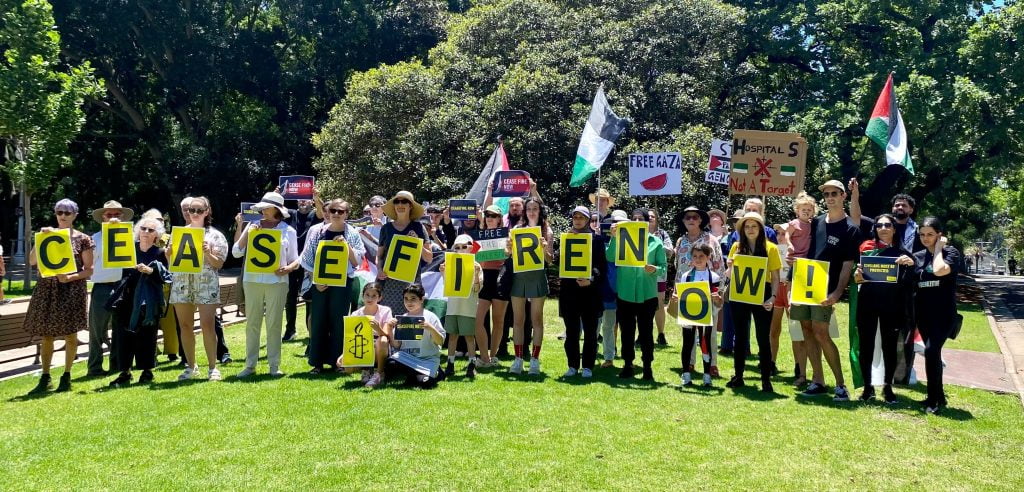
The Gaza crisis is a global emergency. We must not normalise it.
Many of us have felt the crisis in Gaza as profoundly, uncommonly distressing, even by the standards of armed conflict. There are several reasons for this.
Partly it’s the volume and intensity of disturbing content we’re seeing. New technologies have meant witnesses can document war crimes in graphic detail and share the evidence widely and instantly.
Another reason is the destabilising shift in perspective. We’re not used to seeing such blatant complicity from our own governments. While we might condemn certain policies or actions by our leaders, most of us believe that, broadly speaking, we’re on the right side of justice and history. Their failure to act, and even willingness to support those carrying out war crimes, has led many of us to question this basic assumption.
But another reason the annihilation of civilians in Gaza feels extraordinary or even unprecedented is that – at least in some ways – it is. Since Israel began its assault on the Occupied Gaza Strip, the crisis has generated a steady stream of grim milestones and sickening statistics. Here are just a few of them:
- According to Save the Children, the number of children killed in Gaza in the first three weeks of Israeli bombardment exceeded the annual number of children killed in global conflict zones every year since 2019.
- Deaths of journalists have surpassed any conflict in three decades, according to the International Federation of Journalists.
- The United Nations announced that more UN aid workers have died in Gaza since Israel’s assault began than in any other single conflict in the organisation’s history.
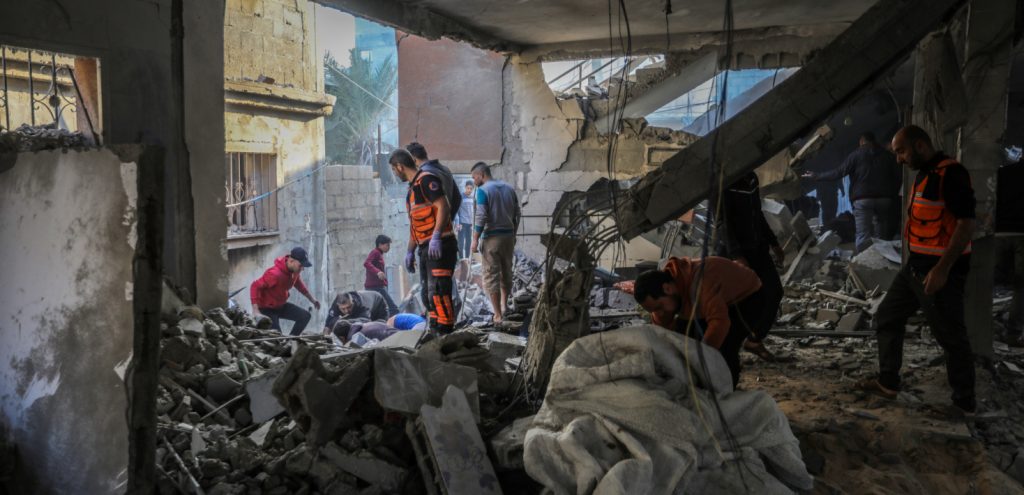
This crisis impacts Palestinians everywhere.
This conflict has been confronting even for people who have no personal connection to it, other than their shared humanity and the vicarious grief they feel as fellow parents, children, husbands and wives, brothers and sisters. But for Palestinians – those living in the Occupied Palestinian Territories as well as those in diaspora communities around the world – the wound goes far deeper.
“In the first Nakba, 750,000 of my people were displaced. Today that number is 2.2 million. We collectively feel like this is a second Nakba.”
Mohamed Duar, Occupied Palestinian Territories and Israel Spokesperson for Amnesty International Australia
The recent history of the Palestinian people has been defined by unbreakable resilience in the shadow of relentless hardship. But the unfolding horror of these past months has pushed them to breaking point. When describing how the crisis has impacted them, many Palestinians have said that this latest chapter feels like another Nakba.
Most people in the West think of the Nakba, if they’ve heard of it at all, as an isolated event that happened in the mid-20th century. For Palestinians, it never ended.
The Nakba began in 1948…
“…the refugees wishing to return to their homes and live at peace with their neighbours should be permitted to do so at the earliest practicable date, and… compensation should be paid for the property of those choosing not to return and for loss of or damage to property…”
UN General Assembly Resolution 194 on the situation in Palestine, December 1948
Palestinians today remember the beginning of the Nakba. Israeli settlers uprooted more than 750,000 Palestinians from their homelands, eradicated more than 400 villages, and killed thousands. In the decades since then, the situation for Palestinians hasn’t improved. In fact, it’s even more desperate.
…and it continues in 2023.
Even before the recent escalation of violence in October, there were more than 5.2 million registered Palestinian refugees, making them one of the world’s largest refugee populations. Most of them live in Jordan, Lebanon, Syria and the Occupied Palestinian Territories (OPT). Many of them live just around 100km from their original homes.
This year marks 74 years since the ethnic cleansing and displacement of more than 700K Palestinians in 1947-1948.
— Amnesty MENA (@AmnestyMENA) May 15, 2022
Since then, the #Nakba (catastrophe) has been engraved in Palestinian collective consciousness as a story of relentless dispossession.
👉 https://t.co/ifmitUTUyi pic.twitter.com/RzQeGOjMlG
When we’re blind to their suffering, we are complicit.
There’s a view among some non-Palestinians that this crisis began with the vicious attacks on Israel carried out by Hamas and other Palestinian armed groups on 7 October – attacks Amnesty International has loudly condemned. Some also argue that the Israeli assault on Palestinians in the occupied territories is a justified response to this ‘unprovoked’ aggression.
When Palestinians see the atrocities currently being perpetrated against their people, they see a continuation of the original Nakba. They remember 1948 and all the waves of violence and dispossession that followed.
When Palestinians see entire city blocks destroyed and whole families incinerated in indiscriminate bombings, they remember dozens of previous episodes of conflict. They see a pattern of aggression and impunity playing out with nightmarish regularity for 75 years. And they remember, with a crushing sense of powerlessness in the face of injustice, the countless times the international community turned a blind eye. They remember every time we denied them a voice by failing to hold the perpetrators to account.
When we ignore and forget the horrors of the Nakba, we reinforce the message that universal rights aren’t universal after all. If we allow this injustice to go unchallenged, we become complicit in it.
When we choose to see, we are a force for justice.
But the reverse is also true. When we refuse to let ourselves be blind to the reality Palestinians face every day, we tell them that they are seen. When we remember with them the horrors of the past 75 years, we show them that their lives, their joys, their grief and their dreams matter as much as those of any other person.
For too long, Palestinians have been systematically oppressed and silenced by Israel’s military occupation and system of apartheid. When we listen to their words and share in their lived experience, we show them that we will not allow them to be erased. We stand in solidarity with them to challenge this injustice.
By amplifying Palestinian voices, we pay homage to those who have harnessed the power of the UDHR through a decades-long struggle for liberation, equality and independence.
We call on people everywhere to bear witness and to speak out.
Our team has been speaking to survivors, eyewitnesses and members of the Palestinian-Australian community. We echo the sentiment of UN Secretary-General António Guterres, who on Thursday invoked Article 99 of the UN Charter. A rare diplomatic step, Guterres’ invocation of Article 99 urged the international community to prevent further escalation of the “utter, deepening horror”, by demanding an end to this crisis.
I reiterate my appeal for a humanitarian ceasefire to be declared. This is urgent. The civilian population must be spared from greater harm.
António Guterres, Secretary-General of the UN
As members of the international community, we all have a role to play in calling on our leaders to act. Now.
For more than 60 years, Amnesty has campaigned for justice, freedom, truth and dignity wherever they have been denied. We work to ensure governments treat human rights with the same gravity, and that they promote and protect human rights for everyone without discrimination.
On World Human Rights Day 2023, on the 75th anniversary of the UDHR, the world grapples with alarming levels of conflict, growing inequality and the existential threat of climate crisis. We must continue to advocate for a future where everyone, everywhere, enjoys human rights.
Human rights for everyone, everywhere.
That’s the basic principle underpinning 30 rights outlined in the UDHR. And it’s the cornerstone that Amnesty, with our seven-million-strong power base, must continue to fight for every day. No matter what distinctions people have, every human being has equal rights.They’re universal, indivisible and interdependent.
It starts with us.
Together, we can and must re-imagine, innovate and lead for future generations. We’ll keep working toward solutions to end violence and increase support for human-rights defenders. And we’ll invest in world leaders who prioritise collective rights and act on the belief that we, as humans, are all free and equal. It starts with us.
Amnesty has been on the ground in Gaza documenting human rights violations. Your donation today can support Amnesty’s urgent crisis response and help us continue to research, monitor and call for perpetrators to be brought to justice.
